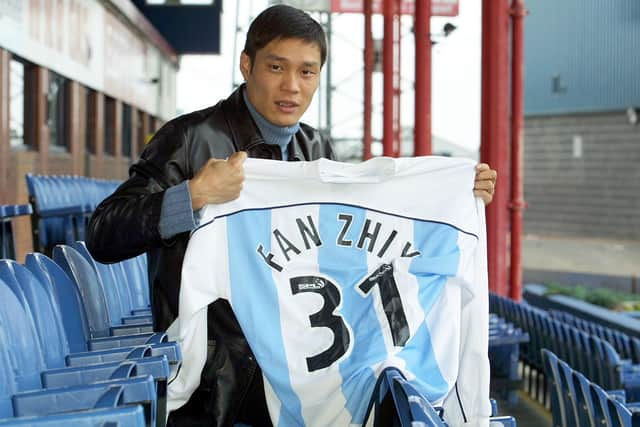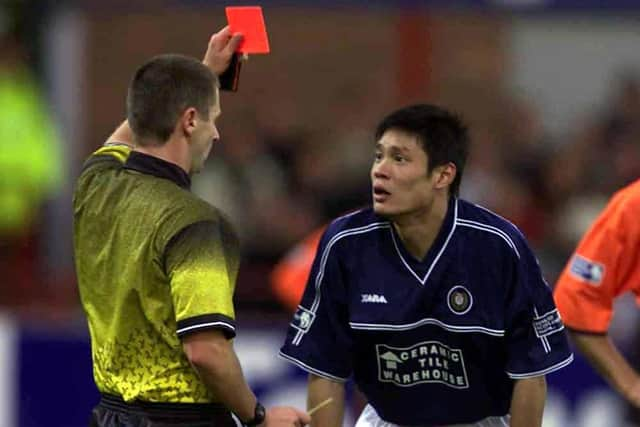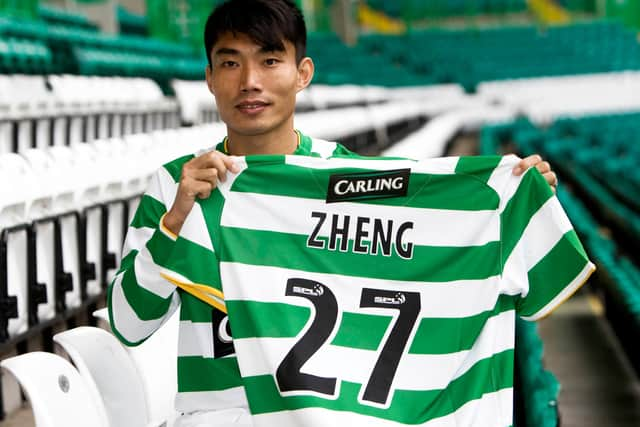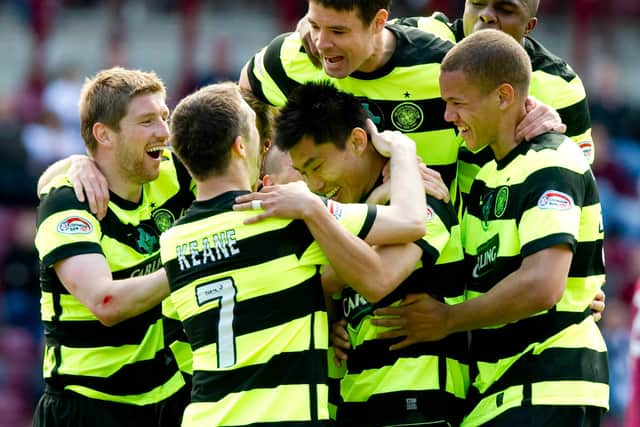Celtic's Zheng Zhi and Dundee's Fan Zhiyi: Few Chinese footballers have left such an indelible mark on British football
Their report, inauspiciously titled “Chinese player to turn out in England”, was typical of the coverage reserved for the man born in Buxton to an English mother and a father hailing from China’s southern province of Guangdong, as it relied heavily on details of his ethnic background to make the most normal of debuts into headline news.
The short piece didn’t ooze any racial hostility though; instead, it looked like an expression of genuine astonishment at what was perceived to be a huge novelty and something of a landmark for football on the British Isles.
Advertisement
Hide AdAdvertisement
Hide AdThe unusual headline must have drawn the attention of quite a few patrons of the pubs on and around Nethergate; perhaps someof them, their curiosity piqued by an unexpected addition to a game still far from today’s cosmopolitanism, were even keen to find out that Soo’s Stoke City was bulldozed 6-1 by Middlesbrough on the following Saturday.


Certainly none of them imagined that, more than half a century down the line, their sons and grandsons would live to see Dundee itself become the gateway for Chinese players into the Scottish Premier League, the starting point of a story which may not be studded with glory or paved with unforgettable moments but is still intriguing nonetheless.
Much of what you need to know about Fan Zhiyi is superbly condensed into a 2021 commercial for the Vans China footwear company, where the former centre-back gets teleported back to 1981 after hitting his head on the ground, only to find out that a younger version of himself has fallen in love with skateboarding.
In an attempt to make the kid change his mind, today’s Fan shows off his unrefined touch with a short sequence of wonky keepy-uppies, before pursuing an inelegant chase of his young self down the bumpy alleys of his hometown, somewhat reminiscent of the way he used to run every time his improvable on-field positioning had given his opponent a chance to take flight behind his back.
The commercial eventually ends with the two sitting on the bank of a river, the old Fan finally persuading the younger that, all in all, football isn’t such a bad idea, in a display of that same stubbornness that allowed him to carve out a respectable career in the beautiful game. Ask Michael Owen and Emile Heskey for references.


When Liverpool showed up at Selhurst Park for the first leg of the 2000-01 English League Cup’s semi-finals, they certainly expected a simple task. If neither of the two English internationals managed to get on the scoresheet that day, it was mainly thanks to the heroic efforts of a Chinese 31-year-old who, between one hectic rush and another, efficiently marshalled Crystal Palace’s rearguard and lived up to the nickname of ‘Fan Jiangjun’ (General Fan).
His remarkable performance unsurprisingly attracted the interest of Liverpool themselves and Newcastle, with the Reds manager Gérard Houllier directly approaching the agent of the centre-back in a pub. However, what would have been the opportunity of a lifetime for most wasn’t seen as such by an ardent patriot like Fan.
“The most important thing is that if you go to Liverpool or Newcastle, you can’t play for the national team,” he recalled years later. “They put it in the contract.” That’s exactly the reason why he ended up on the Firth of Tay instead, wearing the dark blue strip of Dundee FC for the 2001-02 campaign. Or at least for a part of it.
Advertisement
Hide AdAdvertisement
Hide AdFan Zhiyi was a trailblazer. Upon being signed by Crystal Palace in 1998, he and fellow countryman Sun Jihai had achieved immense popularity in their homeland for being the first two Chinese nationals to play in the English league. When the former moved to Scotland, Dundee instantly enjoyed a fair share of the glow emanating from him, delivering them a cult following in the world’s most populated country.


Back in China, millions tuned in for his unveiling, which was aired on television; newly-acquired fans stormed the club’s website, so much so that Dundee deemed it necessary to launch a Chinese version of the site in early 2002. The craze even led to Dundee and Abertay Universities receiving hundreds of applications from Chinese students following the Asian star’s arrival.
The impression made by Fan on the pitch wasn’t bad either, although his debut wasn’t as sweet as he might have hoped. Desperate to start his spell at Dens Park on a high, General Fan showed up for the derby against Dundee United on week one ready to unleash all of the impetuosity that was such a distinctive feature of his game.
As a result, he was shown a yellow card early in the game for a foul on Jim Hamilton. Then, shortly after the hour mark, the official had no hesitation in issuing another caution, this time claiming that the Chinese player had dived under pressure from Jamie Fullarton to win a free-kick. And yet, his lack of half measures eventually turned into an asset for the Dees, as he often proved a reliable option at both ends of the park – having played at centre-forward in his early career days – and three goals in 18 appearances by the time spring came round were a more than decent contribution.
Quite unsurprisingly, Chinese media outlets proved diligent in covering every bit of Fan’s life in Scotland, never failing to add a triumphalist sheen to whatever he did. A good example is an article run by bi-weekly publication Soccer News in April 2002 headlined “Dundee bows in front of the distinguished Chinese: Fan Zhiyi’s popularity in Scotland is skyrocketing”, and reporting a scene from the home game versus Kilmarnock when he was subbed off and all the home fans stood up and bowed to him, “probably for the first time in the club’s history”.


China News Weekly went as far as sending a whole crew to Dundee in order to record a day in the life of General Fan. The resulting article, although quite dull, was complimented by a remarkable photo shoot of the Shanghai-born and bred player doing things: Fan slaloming through the poles at Caird Park; Fan standing in front of the kitchen sink with anapron covered in Chinese characters; Fan sleeping on a chequered couch with his shoes still on and his feet on the backrest.
He didn’t exactly look like the most socially active man on earth, and the same was confirmed by his former teammates in London, who were always puzzled at his refusals to follow them to the nearest pub for a customary pint. And yet, what he declared to his country’s press appeared in stark contrast with the idea most people in this part of the world had of him.
“There’s absolutely no nightlife in Dundee,” he told the Nanfang Daily in June 2002. “When night comes, there’s nobody on the street, and you won’t find a pub open after 9PM. Compared with Shanghai, here’s simply countryside.”
Advertisement
Hide AdAdvertisement
Hide AdFan then went on to rank Scotland’s urban centres by stating that: “Even if it’s exciting, Glasgow is too noisy, it looks like a huge bazaar. Edinburgh’s not bad, I always take the plane from there so I know it a little better. It’s a famous and ancient medieval city, full of places with historic significance. Previously, all I knew was inferred from ‘Braveheart’, so I didn’t have a real knowledge of Scottish culture and history, but wandering through Edinburgh allowed me to expand my horizons.”
After that, Fan restored Dundee’s honour by praising its laid-back atmosphere and slow rhythms, which suited both his parents (who were living with him most of the time) and himself, as a professional footballer. The telephone interview took an even more grotesque turn towards the end, when the defender spoke of Ibiza as a relatively unknown yet dreamy place far from the UK’s climatic toughness, where “all of the world’s ravers converge, making for an unforgettable atmosphere.” Definitely not what you would expect from an old-school, 32-year-old centre-back living with his parents and never described as the life of the party by anyone.
Whether he was just trying to brag to Chinese readers, or his old Crystal Palace teammates had completely misunderstood his sobriety, is not for us to know. What’s certain is that Fan saw the 2001-02 SPL campaign as little more than a long preparation for what he really had at heart: the Chinese national team, whom he’d just captained to their first ever World Cup qualification. Accordingly, Dundee didn’t oppose a loan move to Shanghai COSCO in March, so allowing him to inspire his country in the build-up to what was, and still is, China’s biggest footballing achievement to date.
And yet the move did not pay off, as the Chinese squad coached by Bora Milutinović conceded nine goals without scoring one themselves in the group stage. Fan played only a single game due to an injured left foot, yet it proved enough for him to be involved in claims of match-throwing. But things got even trickier when the General went back to Tayside. And here’s where the story splits in two.
In the Dundee version, the club was about to appoint him official ambassador in an attempt to build on their new-found popularity in China, and had offered him a contract on the same terms as he’d enjoyed before the loan spell, which the player refused to sign. The other version was related by the player himself to Nanfang Daily reporter ShenPeng, when the two caught up in a Glasgow coffee shop in late August, and it goes pretty much as follows.
According to the Chinese, Dundee was in a very tense financial situation and wanted to force him to pen a new deal under the threat of not letting him play if he didn’t. All thisdespite the old contract being still in place and the new one coming with a lower salary. To ensure he didn’t break character, Fan ended the chat by addressing his beloved supporters: “Tell all the fans back in China not to worry about the fact that I haven’t been playing here in Dundee. Even if I stumbled upon such an annoying problem, I’ll sort everything out and get back on the turf at the earliest.”
He was a man of his word. He reported Dundee’s allegedly unfair practices to the FA, then flew out to Cardiff City and never set foot on Scottish soil again, leaving a taste as bittersweet as Shanghai’s famous pork ribs in the mouth of the dark blue supporters. Nevertheless, his Scotland shenanigans hardly undermined Fan’s fame on the Asian continent, where he had claimed the Asian Footballer of the Year prize earlier in 2002.
China would have to wait until 2013 to see another fellow countryman walk on that same stage with that trophy in his hands. Once again, it would be one with a past north of the Cheviots: Zheng Zhi, at Celtic in the 2009-10 season.
Advertisement
Hide AdAdvertisement
Hide AdTo be precise, ‘China’s Becks’ (or simply ZZ, if you prefer) wasn’t the second player from his country to ply his trade in Scotland. Indeed he wasn’t even the first to do so with the Hoops. He was preceded by Zhengzhou-born Du Wei, who joined Celtic in 2005 on a loan deal from Shanghai Shenhua. Unfortunately, his ill-fated European spell consistedof just a single appearance. Or should we say half an appearance.
On 8 January 2006, the centre-back was finally given his first start in a Scottish Cup tie away to Clyde, on what was supposed to be Roy Keane’s big day. After the first 45 minutes the Celts had already conceded two goals, Du had been embarrassingly outmuscled by former Rangers youngster Tom Brighton, and Gordon Strachan couldn’t help but cut his debut short at the half-time break. He never stepped onto a football pitch in the Old Continent again.
“Du might have looked very sturdy, but there was a patent disparity between him and the Scottish players in terms of strength,” says Li Hui, the founder of Shanghai Celtic Supporters’ Club. “Probably, he just wasn’t suited to that kind of football. Had he been given more chances, he still wouldn’t have performed much better. ZhengZhi, on the other hand, fared a little better. He was nimble, had good technique and knew how to create goal-scoring opportunities. He even scored a belter at Celtic.”
The goal Li refers to is the winner beautifully volleyed home by the Chinese midfielder in the season’s last game, away to Hearts, when mathematics had already condemned Celtic to an inescapable second place. Resolutely pursued by manager Tony Mowbray, ZZ joined Celtic in what was inevitably seen as yet another commercial move aimed at breaking into the remunerative Asian market.
The Celts boss strongly denied such allegations, pointing out how the purchase of the 29-year-old had been justified by the departure of Paul Hartley and Shunsuke Nakamura of Japan. In fact, Zheng was more similar to the former, but you can guess whom the perfunctory eyes of public opinion decided to liken him to. And so, while rumours spread of theCeltic board taking advantage of him for photo shoots and PR gigs in view of the opening of a megastore in Beijing, the Chinese player was instantly touted as the heir to someone whose talent he simply couldn’t match.
Interestingly enough, the name of the Japanese star was also ubiquitous in much of the stuff Chinese fans had to say about the transfer. In September 2009, Chinese website NetEase Sports ran an article which drew upon the opinion of The Herald’s Michael Grant about Zheng as a replacement for ‘The King of Japan’; the comment section below it is as exemplary as you may imagine. “Who does Nakamura think he is?” reads one. “Look at our ZZ, so many hotshots got a broken leg when they faced him. Long live the Chinese football kung-fu!” Another commenter went even further by stating that “Zheng Zhi knows the technique for breaking legs painlessly! He can bring Chinese kung-fu to Celtic. Zheng Zhi, the Chinese missionary!”
Despite such expectations – or perhaps because of them – Zheng’s hard-working ethos and rough yet technical style went largely unnoticed at Parkhead. After a promising debut in a 2-1 defeat to Rangers, his form gradually dipped, partly courtesy of a side that was going downhill, and partly thanks to his being probably a little too lightweight for such a league.
Moreover Mowbray, despite his declared liking for the captain of the Chinese national set-up, used him rather sparsely and, with the title race virtually over for Celtic as early as January, followed by the manager’s sacking in March, ZZ’s chances of returning to the first team as a regular grew even flimsier. Ultimately, Nakamura’s supposed successor left for Guangzhou Evergrande with 19 caps to his name (a number of which were from the bench), a practically useless stunner on a May afternoon, and the lingering impression that, under better circumstances, the qualities that made him into a legend of Chinese football would have shone a little brighter.
Advertisement
Hide AdAdvertisement
Hide AdZheng’s lacklustre stint in Glasgow didn’t tarnish his reputation back in China. And yet, contrary to what one may think, he was influential if not instrumental in the emergence of Celtic as the Scottish club with the most fans in Asia’s biggest country. With supporters’ clubs in Beijing, Zhengzhou, Shenzhen and, obviously, Shanghai (with epicentres at The Blarney Stone on Yongkang Road and The Camel Sports Bar down at Weifang West Road), the Celts can count on quite a passionate Chinese fan base, though not as numerous as those of the powerhouses from Europe’s big five leagues.
“Actually, compared with the number of Premier League fans in China, Scottish football enthusiasts are just not as many,” Li points out. “The main part of we Bhoys is made up of Chinese who studied in Glasgow. There are also some who started following the team not more than three years ago, but Celtic is by no means their favourite club. They just have some sort of interest towards it, or even just think that the jersey looks cool. I’ve been supporting Celtic for 19 years now, but there aren’t many like me here. When Du and Zheng joined the club, it grabbed the attention of some more Chinese, but it wasn’t real support. Recently, after China women’s national team player Shen Mengyu joinedCeltic, many female students living in Scotland have grown interested. They turn up at the stadium almost every weekend.”
While the influx of the two Chinese signings can’t be totally downplayed, it certainly didn’t match the expectations Celtic might have harboured despite what Mowbray declared, and it’s safe to assume that the love of the most loyal supporters in the country has little or nothing to do with their two illustrious compatriots. “I love Henrik Larsson,” admits Li. “I grew fond of him at USA 94 and, when he moved to Celtic, I kept rooting for him. That’s how I became a Celtic fan. Then, in the second half of 2018, I founded Shanghai CSC along with two Scots and an Irishman.”
For its part, Celtic doesn’t overlook all the affection coming from the Far East either. “They now have an official Weibo account, set up in 2017,” the founder of Shanghai CSC explains. “There’s a Chinese employee at the club, he’s in charge of marketing initiatives and the development of the Chinese market. I’m fairly satisfied with that, there’s quite alot of interaction and they update us with the club’s news on a daily basis.”
That news is edited, translated and pipelined through an apparatus of optical fibre cables running all the way to the other side of the planet, in order to feed the passion of a group of like-minded people who regularly come together inside cheap facsimiles of the British or Irish pubs to cheer on footballers playing some 9,000 kilometres away.
Such a scene is the result of a long process of globalisation and changing migration routes, not just for professional football players. It’s the latest chapter in a story that covers the almost 90 years which stretch between the day when an old newspaper put the words “China” and “football” near each other for the first time in Scotland, and now.This piece first appeared in Nutmeg, Issue 23. Franco Ficetola is an Adjunct Professor at Yantai University and a freelance football writer from Rome, Italy. He’s worked with The Guardian, These Football Times and many others. @Franco92C14
Get a year of unlimited access to all The Scotsman's sport coverage without the need for a full subscription. Expert analysis of the biggest games, exclusive interviews, live blogs, transfer news and 70 per cent fewer ads on Scotsman.com - all for less than £1 a week. Subscribe to us today
Comments
Want to join the conversation? Please or to comment on this article.